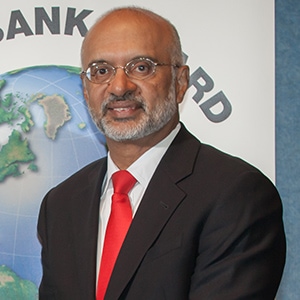Piyush Gupta, CEO of DBS, talks with Global Finance about the bank’s record year, its digital transformation and the value of owning your own technology.

Global Finance (GF): What were the key underlying components that lifted the bank to record profits in 2017?
Piyush Gupta: DBS’s record year in 2017 was underpinned by strong growth across multiple businesses. In particular, our wealth and SME segments delivered exceptional performances, delivering income growth of 25% and 11% respectively.
By geography, Singapore and Greater China were the outperforming markets. Despite our dominance in Singapore, we continued to gain market share in areas such as mortgages and credit cards. Hong Kong also turned in a strong performance with its ability to capture outbound China flows.
In 2017, we successfully completed the integration of ANZ’s retail and wealth franchise across Singapore, Hong Kong, China, Indonesia and Taiwan. Completing a five-market integration within a 15-month timeframe was not easy and consumed extensive management resources. The upside is that the transaction is proving to be highly synergistic with our existing franchise. It is not only earnings-accretive from this year, we now expect it to contribute net profit in 2018 that is more than initial projections.
With digibank, because we were first-to-market with a groundbreaking proposition, it was difficult to predict what the customer reception might be. So we are very encouraged by the response—1.8 million new customers in two years. We have also been able to replicate our success with digibank in India and in Indonesia.
GF: How does the bank intend to grow its home business in Singapore?
Gupta: In Singapore, DBS is a universal bank, serving all client segments. In the top end of the market, the bank helps our corporate clients with their overseas expansion, providing them with banking and advisory services. In the SME space, we have been focused on digital innovation to make banking simpler and more time-efficient. With banking made simpler online, we are acquiring more customers and deepening existing relationships. In 2017, 80% of new SME customers in Singapore started their relationship with us digitally.
In consumer wealth, we are also relentlessly pursuing a digital strategy. This not only improves customer experience, but also relationship manager productivity. In 2017, 37% of our new wealth management customers started their relationship with us online.
GF: Tell us about DBS Bank’s wealth management business and its outlook going forward.
Gupta: The wealth management industry is highly competitive. Despite these challenges, our wealth franchise continues to grow from strength to strength. Today, it contributes around 18% of total group income. This strong performance is attributed to robust organic growth and the acquisition of the ANZ business which added over 100,000 affluent customers in Asia.
GF: What is your digital strategy?
Gupta: To become truly digital to the core involves a complete transformation of the bank…and 2017 was a breakthrough year. In 2009, our technology, hardware, data centres, network management and app development were mostly outsourced. By the end of 2017, we were 85% insourced. This shift is important because in order to be more digital, we need to own the technology. At the same time, we moved from legacy technology, such as big mainframes in large data centres, to cloud-native technology. Today, two thirds of our applications are cloud-ready.
Last November, we showcased our digital transformation to the investor community and the reception was highly favorable. Some analyst highlighted how DBS’ digital strategy is one of the most comprehensive in the world. Our market capitalization rose 44% in 2017, making DBS the most valuable company in Southeast Asia.
GF: How significant is ESG in DBS bank’s business plan?
Gupta: Sustainability has been at the core of our purpose-driven DNA. From the time of DBS’ founding as the Development Bank of Singapore, we have believed in the importance of good citizenship. This involves providing responsible banking, creating social impact by giving back to the community through the bank and DBS Foundation, as well as doing our part of the environment and combating climate change. DBS was one of the first Singapore companies to launch a green bond last year. We were also the first Singapore bank to be included as an index constituent of the FTSE4Good Global Index, a global sustainability index. DBS was the first Asian bank and Singapore company to join global renewable energy initiative RE100, and to commit to using 100% renewable energy for our Singapore operations by 2030.



